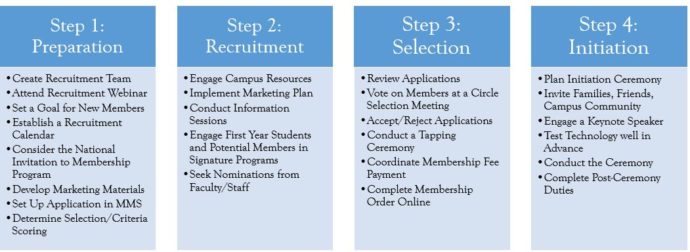Contents
(Click on link below to be taken directly to that section)
Download the FY2024 Recruitment and Initiation Guide
Circle Membership Process
- O∆K seeks to identify, celebrate, and engage collegiate and community leaders from different backgrounds, perspectives, and generations.
- The circle’s goal should be to cast a wide net to recruit all campus and community leaders who emulate our mission and values and meet our membership criteria. This includes undergraduate students, graduate students, faculty, staff, and community leaders.
- A circle should initiate individuals from each of the five pillars of campus life.
The Membership Cycle
General Notes on Recruitment
- Recruitment is specific to each circle, however, the most successful circles do the following:
- Establish a firm timeline and maintain it year after year. This recruitment pattern becomes known on campus so a leader can anticipate the recruitment cycle.
- Delegate the bulk of the day to day recruitment operations to a membership committee with an elected/selected chair. The circle officers should oversee but not manage the process.
- Establish firm target estimates of new members needed to grow the circle in numbers, diversity, or both.
- Market heavily throughout campus including emails, postings, invitations for nominations from senior administrators and faculty.
- Conduct information sessions online for students who may be eligible but not aware of O∆K
Recruitment Timeline
( download the Interactive-Circle-Recruitment-Timeline-90-60-45)
- The recruitment timeline provided here is a recommended template for an efficient recruiting period of 45 days. The timeline does not include some additional preparation time.
- 45 days is more than adequate to conduct a complete recruitment process with information sessions, application review, and circle voting ending with an initiation ceremony.
- The entire process can be managed virtually because the application, payment, and initiation ceremony can all be completed online. Familiarity with Zoom, WebEx, and other conferencing software allows circles to hold information sessions and meetings for voting without ever having to be in the same room.
Recruitment Process
- Recruitment is specific to each campus.
- Develop relationships with freshman and sophomore programs to identify potential leaders
- Make it personal – invite potential candidates to circle meetings or virtual forums
- Use the campus resources to gather names of the top 35%
- Make sure you include each of the five pillars
- Once you have your recruitment plan, you are ready to navigate the Member Management System.
Recruiting ALL Campus Leaders
- OΔK was founded on the principle of bringing the leaders of different campus constituencies together.
- We are NOT an exclusive society. Exclusive means the recruitment process seeks to EXCLUDE those who don’t meet the criteria.
- We have only three (3) primary criteria
- Class: Undergraduates must be a sophomore, junior, or senior by credits having been enrolled at least one full term at the institution.
- Academic Eligibility: Undergraduates must be in the top 35% of their class and enrolled for at least one/half year. Graduate/professional academic eligibility is determined by each circle.
- Leadership: Undergraduate students, Graduate/Professional students, Faculty/Staff, and Alumni must have demonstrated leadership in the campus and/or community.
Guidelines for Including Sophomores
The Mission Committee and National Headquarters staff recommend the following guidelines for circles to consider as they incorporate sophomores into a circle.
1) Definition of Class
Omicron Delta Kappa has five classes of membership as defined by the O∆K Policies and Procedures: Undergraduate student, graduate student, faculty or staff member, alumni, and honorary (honoris causa). The undergraduate class has three sub-classes: sophomore, junior, and senior. At some institutions, these are known by other designations such as second-year, third-year, and fourth year. The graduate student class includes students in graduate and professional programs such as law, medicine, dentistry, pharmacy, etc.
2) Determining the credits required for a class.
The O∆K Policies and Procedures state that the class of a student is determined by the institutional guidelines. The credit hours required to attain each sub-class varies, but the list below can be used as a guide.
-
- Sophomore, or second-year, typically at least 30 credit hours completed
- Juniors, or third-year, are typically 60+ credit hours completed
- Seniors, or fourth year, are typically 90+ credit hours completed
Circles should include in their local bylaws what the institutional criteria for determining the class of a potential initiate is so that it is clear to any candidate what the class level.
3) No Requirement to Initiate Sophomores
There are no provisions in O∆K Policies and Procedures that prevent circles from accepting only one class of students, however, circles are strongly encouraged to initiate all classes within the policies that limit graduate, faculty and staff, and alumni initiations. The Society strongly discourages any self-limiting practices. Circles should be open to the widest possible pathways to recruit and initiate members as the policies and procedures will allow.
4) Strategy for the Initial Inclusion of Sophomores
Each circle is expected to develop a strategy for the inclusion of sophomores into the circle. The strategy should include three basic principles:
-
- Purpose
- Specialized Leadership Development
- Numeric Targets – determine how many of each class do you intend to initiate
5) Sophomores must have full membership status
The revised O∆K Policies and Procedures now include sophomores as full members of O∆K. Circles may not in any way create a system that allows for sophomores to be considered anything less than full members. Criteria for circle officer positions may include expectations of experience within the circle but should not be written in such a way as to always exclude sophomores from executive leadership.
6) Petition to increase the maximum number of initiates
The O∆K Policies and Procedures place maximum limits on the number of undergraduate students a circle may initiate based on the undergraduate population. At this time, very few circles ever approach their maximum number. If the inclusion of sophomores in significant numbers would conflict with the maximum limit, a circle may petition the National Headquarters for a waiver. Waivers will be granted for two years. The National Headquarters will monitor the requests and if it becomes necessary to change the maximum percentage allowed for all circles, the National Headquarters will work with the Mission Committee to propose recommended changes to the maximum levels.
Commitment to Diversity, Equity, and Inclusion (DEI)
- OΔK has redoubled its commitment to increasing our recognition of individuals of underrepresented populations.
- In order for OΔK to have the membership representative of the future of this country, this world, we need our circles to expand their recruitment practices.
- The recommendations in this section are designed to held guide circles to seeking out the leaders who may not be recognized in traditional leadership programs.
Suggestions for DEI Recruiting
-
- Move beyond traditional avenues of recruitment.
- Target online recruiting efforts at Historically Black, Hispanic/Latino, Asian and other fraternities and sororities.
- Host online information sessions specifically for these and other groups that may be traditionally underrepresented in your membership.
- Invite faculty/staff members with connections to Multicultural Centers or other special programs to recommend leaders for membership.
- Seek faculty and staff persons of color to recommend individuals and to be recruited as possible members.
- The most important factor is to open the recruitment process to those populations that are underrepresented in your circle and even your institution.
Selection based on the Five Pillars: Horizontal v. Vertical Leadership
- Recruitment and selection from the five pillars should look for leaders who have either breadth across multiple pillars or depth in one pillar. This is the process of looking for Horizontal Leadership or Vertical Leadership.
- Horizontal Leader: One engaged as a leader in many different pillars of campus life.
- Presented research at a conference = Academics
- Writes for the campus paper = Communications
- Leads the campus food pantry = Service
- Vertical Leader: One who has engaged deeply in leadership in one pillar of campus life.
- Lead role in theater productions = Arts
- Directs one-act plays = Arts
- Served on the arts council = Arts
- Each leader has much to contribute to a circle and to OΔK as a whole.
- If you balance the Horizontal and Vertical you will complete the Circle!
Use National Recruiting Materials
Applications and Fees
All potential members of Omicron Delta Kappa must create a profile on MyODK (my.odk.org) and complete the Omicron Delta Kappa National Lifetime Membership Application.
All regular initiates must pay the National Initiation Fee ($94.00) before initiation.
The membership form can be tailored to circle needs, so there is no need to use a separate application.
The circle advisors and student presidents can download and review applications. Membership fees may be paid through the circle or online through the national membership payment portal in MyODK.
Once all applications have been approved and membership fees collected, one of the circle advisors must complete the Membership Certificate Order. Please note: the certificate order should not be submitted until the circle has received payment of fees directly OR received verification that the fees have been received through the portal.



